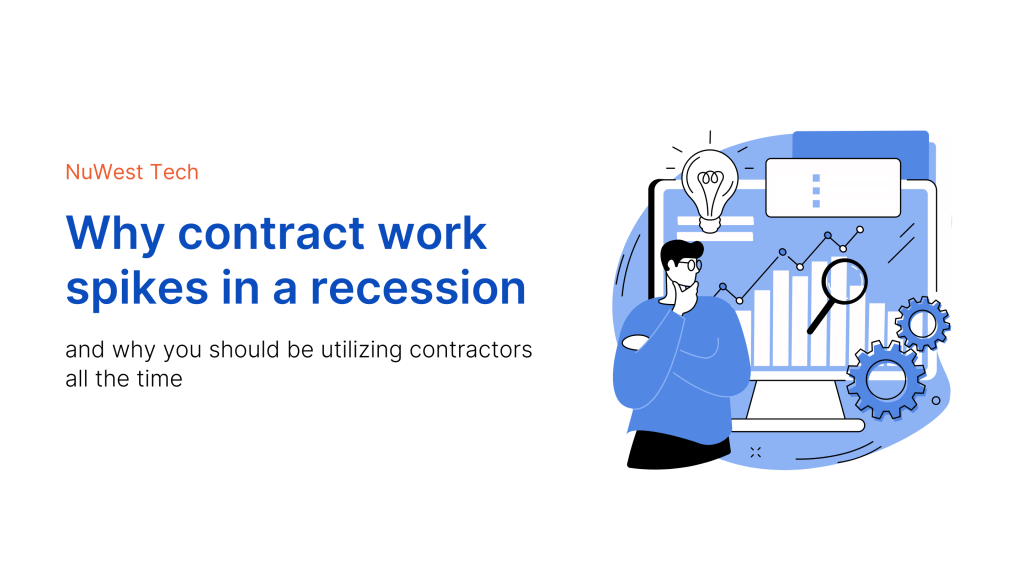Why contingent and contract work spikes in a recession (and why you should be utilizing contractors all the time)
Contract work (or contingent work) is an employment type where a worker is hired to complete a specific job for a set period of time. A recession is defined as a significant decline in economic activity that is spread across the economy and lasts more than a few months. In these periods most companies see demand fall and future uncertainty increase.
How do businesses survive recessions? Planning for them. We’ve heard it a thousand times, “failing to plan is planning to fail”, and it really is that simple.
Studies have shown that business that flourish through recessions have contingency plans and are prepared for a down economic situation. Conversely, companies that barely scrape by or don’t make it through are companies that have failed to plan and instead react defensively by making drastic cuts across the board.
On average, human capital makes up 70% of a corporation’s operating costs, which makes having the right balance of talent on board an important piece of surviving a recession. Have too many employees on board and layoffs become a necessary evil, have too little and teams become overloaded, burnt out, and can’t meet business demands. To strike the right balance, companies need to build flexibility into their workforce before they need it. This can look like taking a reserved approach to expanding headcount and incorporating contractors and contingent workers as projects expand and contract.
The use of contract and contingent employment has been trending upward for the past 5 years, spiking the hardest in 2020 due to COVID-19. The pandemic caused mass layoffs and company closures and has changed the way businesses operate with business owners now stating that their “company’s success is dependent on having access to contractors.”
This has proven to be true with companies leaning heavily on contract workers as large-scale layoffs are being announced regularly and the economic situation hasn’t yet shown signs of recovery.
Incorporating contract employment into workforce strategy is how business can be resilient through recessions and economic downturns (and all the time). Contract work provides flexibility and brings less risk and less overhead than traditional hires.
CONTRACT WORK PROMOTES FLEXIBILITY
Business needs become hard to predict through economic downturns as demand fluctuates up and down. Companies that react defensively to recessions often resort to layoffs to cut costs and stay afloat. Companies that win are companies that scale their workforce alongside demand. Contract employment allows companies scale their workforce up and down to meet demand with a reduced likelihood of layoffs—regardless of the economic situation. When contractors are already onboard, employers can evaluate contract terms and end or extend based on business need and budget. If the company’s workforce needs to be scaled down, contract terms can be revised with a sooner end date. This reduces layoff risk for core staff and allows the contractor to move on to their next project. When teams need additional resources, employers can leverage contractors to fill skill gaps and add hands to their team if headcount has been limited. Contingent talent is viewed as a different type of expense than a traditional hire and doesn’t require a long-term commitment from the employer. This makes contractors an attractive option when budget is tight.
CONTRACT WORK REDUCES RISK AND OVERHEAD
When an organization decides to hire a permanent employee, they are assuming legal and financial obligations like benefits, payroll taxes, unemployment, workers compensation, and disability. Contractors are hired for a set timeframe and budget and under unique terms, making the cost of a contract hire a day-to-day expense, not a long-term obligation.
When contractors are hired through a staffing agency the staffing agency becomes their Employer of Record (EOR) or legal employer. This means that the agency is responsible for HR functions, payroll, background checks, credentialling, onboarding, unemployment, paid time off, benefits, and severance pay (when applicable).
Additionally, internal resource time doesn’t need to be allocated to contractors since HR and payroll is handled by the EOR and management is only responsible for day-to-day management of the contractor, not long-term employee development and career growth.
In short, a contractor’s legal employer is not the company they are physically doing work for which limits the company’s legal and financial risk and long-term expenses.
WE’VE SEEN IT WORK
Telling you why contract work is the smart move is all well and good, but we thought we’d give you a real life example too–
The client: Creative engineering and production firm developing technologies for exploration on Earth, Mars, and the moon
What they’ve done: Since being founded over 10 years ago, the company has taken a measured approach to hiring and built contractors into their workforce strategy from the start. They have built their teams with contingent talent and bring contractors on permanently when it is sustainable to do so. The company had succeeded in strained economic times by maintaining flexibility.
Where they are now: The company tripled in size in from 2020 to 2021 and is still hiring. The company hasn’t experienced layoffs and continues to grow sustainably.
THE SHORT VERSION
Contract talent allows businesses to adapt in unfavorable economic conditions and plays a critical role in the recovery process. 90% of businesses indicate they intend to maintain or increase their use of contractors from current levels, cementing the importance of contingent employment to the current business landscape. If contingent work is not a piece of your current workforce strategy, this is the time to build it in. Get in touch with a NuWest contract talent expert and increase your workforce flexibility before you need it. Schedule a workforce consult here.
LET’S CONNECT

